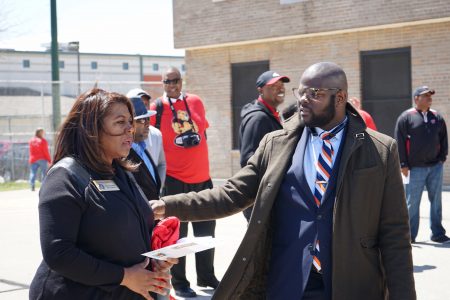Will Referendums Lead to Legal Pot?
Some legislators hope for change after medical or fully legai pot approved in 18 local referendums.
![Marijuana plant. Photo by Jennifer Martin (Own work) [CC BY-SA 4.0 (http://creativecommons.org/licenses/by-sa/4.0)], via Wikimedia Commons.](https://urbanmilwaukee.com/wp-content/uploads/2016/09/Marijuana_Plant_03.jpg)
Marijuana plant. Photo by Jennifer Martin (Own work) [CC BY-SA 4.0 (http://creativecommons.org/licenses/by-sa/4.0)], via Wikimedia Commons.
“Regardless of whether they were in red or blue areas there was support for legalization and evidence that we need to do something about marijuana. I’m hopeful that policymakers in Wisconsin act in the best interest of the people,” said Sargent, who plans to reintroduce legislation to legalize marijuana for recreational and medicinal purposes once the new legislature is sworn in.
The Dane County Democrat said she believes that Republicans, many of whom still believe in the “reefer madness” narrative, need to realize that legalization would result in a huge economic boost for the state and would help to address racial disparities in marijuana law enforcement.
“If you have black or brown skin you’re 10 to 12 times more likely to be arrested for marijuana in Wisconsin. Legalization won’t end our disparities but it certainly won’t hurt to try,” she said.
The results of last week’s referendums showed that 70 percent of voters in Milwaukee County favored full legalization, while 77 percent of voters in Waukesha and 88 percent of voters in Kenosha County favored legalization of medicinal marijuana. Fifty-nine percent of voters in Racine County supported full legalization while 85 percent supported allowing medical marijuana.

Sen. LaTonya Johnson, pictured at Auer Avenue School’s 105th Anniversary celebration, is urging lawmakers on both sides to work together to change the state’s marijuana laws. Photo by Adam Carr.
Across the state, support for legalization, in some form, was supported in each of the 16 counties and two municipalities that held referendums on the issue. Those areas represent over 50 percent of the state’s population, according to Sargent.
Incoming Gov. Tony Evers has publicly supported legalization of medicinal marijuana and stated before the election that the referendums should guide future discourse on the topic. One sticking point, according to Sargent and Rep. David Bowen, is that the Republican-controlled Legislature in Wisconsin could be reluctant to support any agenda put forth by Evers.
“I think it’s possible that we see gridlock,” Bowen said. “It depends on whether or not our colleagues are going to be open to hearing all sides of the argument,” added Bowen, who represents the North Side of Milwaukee and the Village of Shorewood.
One challenge could be garnering support from Assembly Speaker Robin Vos, who stated earlier this week in a speech to his caucus that he would work with Evers, but, “we are not going to roll over and play dead like they assume we probably should.”
According to Kit Beyer, communications director for the Office of the Speaker, Vos has long supported medical marijuana but doesn’t support legalizing recreational marijuana.
“He supports a system where patients can get a prescription for marijuana from their doctor filled at a pharmacy. However, Speaker Vos thinks the change should be made at the federal level first,” Beyer said.
Fellow Republicans including Rep. Dale Kooyenga (Brookfield), Rep. Jessie Rodriguez (Oak Creek) and Scott Allen (Waukesha), who all represent areas that held referendums, did not respond to a request for comment from Milwaukee Neighborhood News Service.
Sen. LaTonya Johnson, a Democrat who represents Milwaukee, is calling for bipartisanship and for the public to put pressure on elected officials.
“I urge legislators on both sides of the aisle to take note of the widespread support shown by voters throughout the state and take action accordingly,” Johnson said. “I also encourage members of the public to not let their voice end with the referendums and keep reaching out to your elected officials and asking that they move forward with changing our state’s marijuana laws,” she added.
“We will work with partners around the state and locally to support legislation that reflects the views expressed overwhelmingly in the referendums,” said Gretchen Schuldt, executive director of the Wisconsin Justice Initiative.
In terms of whether legalization could happen soon, Bowen said he and other legislators who are in support are still in the coalition-building phase and will continue to work with legislators on both sides. In the meantime, he said he will continue to push his bill, which would end workplace testing for THC, the main chemical compound in marijuana, and a bill that was introduced to legalize medicinal marijuana.
Last year, Bowen said, those measures couldn’t even get a hearing, but things could change now that several key positions, including governor and lieutenant governor, have flipped Democratic, and because of the referendum results.
“Republicans still control that chunk of the legislature so it is going to be up to people getting engaged and making sure they have their voices heard and not ignored, including those who have been impacted by the criminalization of marijuana,” Bowen said.
This story was originally published by Milwaukee Neighborhood News Service, where you can find other stories reporting on eighteen city neighborhoods in Milwaukee.
More about the Legalizing of Marijuana
- Wisconsin Voters Back Legal Weed, Lawmakers Still Say No - Anya van Wagtendonk - Feb 12th, 2026
- Wisconsin Lawmakers and Hemp Producers Both Want New Regulations on THC - Lorin Cox - Oct 7th, 2025
- Hesselbein Will Revive Medical Marijuana Bill - Anya van Wagtendonk - Dec 16th, 2024
- Data Wonk: Will State Move to Legalize Marijuana? - Bruce Thompson - Sep 25th, 2024
- Data Wonk: Should Wisconsin Legalize Marijuana? - Bruce Thompson - Sep 18th, 2024
- Indigenous-Led Campaign Launches to Support Medical Marijuana - Isiah Holmes - Sep 4th, 2024
- How Delta-8 Impacts Marijuana Debate in Wisconsin - Richelle Wilson - Jun 18th, 2024
- Milwaukee Officials Praise Rescheduling of Cannabis by Biden - Isiah Holmes - May 20th, 2024
- What Will Wisconsin Do Now That Feds Are Moving to Ease Marijuana Restrictions? - Rich Kremer - May 2nd, 2024
- A Better Wisconsin Together Renews Call for Cannabis Legalization - A Better Wisconsin Together - Apr 20th, 2024
Read more about Legalizing of Marijuana here






















“If you have black or brown skin you’re 10 to 12 times more likely to be arrested for marijuana in Wisconsin. Legalization won’t end our disparities but it certainly won’t hurt to try,” she said.
Hmmm, so – let’s legalize it.